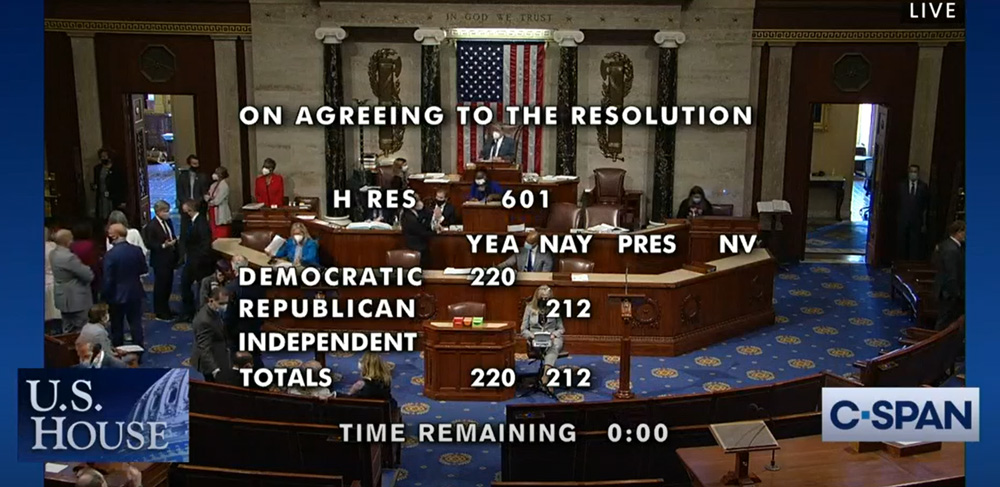
Following a night and morning of intensive negotiations between Speaker Nancy Pelosi (D-Calif.) and a group of moderate Democratic lawmakers, the U.S. House of Representatives on Tuesday passed a $3.5 trillion budget plan, with billions of dollars for moving the nation toward a carbon-free grid by 2035.
The vote was largely a procedural affair, as lawmakers voted on a rules resolution that included a provision that simultaneously passed the budget. It was split strictly along partisan lines, with all 220 Democrats providing a narrow margin over all 212 Republicans.
The vote also opened the way for debate on the $1.2 trillion bipartisan infrastructure bill, which was approved by the Senate along with the budget reconciliation bill Aug. 10-11. The reconciliation process means that Senate Democrats were able to circumvent a filibuster and pass the budget by a simple majority. (See Senate Democrats OK $3.5 Spending Package After Bipartisan Accord on Infrastructure.)

The impasse between Pelosi and the moderates centered on whether a vote on the infrastructure bill would be conditioned on prior passage of the budget. In a statement released Tuesday afternoon, Pelosi committed to passing the infrastructure package by Sept. 27, which was apparently enough for the moderates to join their colleagues in support of the budget.
Referring to the reconciliation process, Pelosi said, “We must keep the 51-vote privilege by passing the budget, and work with House and Senate Democrats to reach agreement in order for the House to vote on a Build Back Better Act that will pass the Senate.”
Aggressive Investments
Details on specific dollar amounts and programs in the budget remain to be hammered out in the House and Senate. However, the budget framework that Senate Majority Leader Chuck Schumer (D-N.Y.) released Aug. 9 included $198 billion for the Senate Energy and Natural Resources Committee to allocate to a range of initiatives, such as a Clean Energy Payment Program, which would pay utilities to hit specific decarbonization targets. The funding would also be used for climate research, federal procurement of energy-efficient materials and building domestic clean energy supply chains. (See Pitching Proposals for the Budget Reconciliation Bill.)
The Environment and Public Works Committee would have $67 billion to allocate to a clean energy technology accelerator focused on low-income solar and other climate-friendly technologies, as well as federal investments in energy-efficient buildings. Environmental justice investments would also be made in clean water affordability and access, healthy ports and climate equity.
While lauding these energy provisions, Pelosi and other Democrats focused more on the education, health care and other “social infrastructure” spending in the bill, such as its provisions to provide two years of free preschool education for all children in the U.S.
Rep. Frank Pallone (D-N.J.), chair of the House Energy and Commerce Committee, said the bill would help to make health care and prescription drugs more affordable. But he also promoted the budget’s clean energy provisions as a job creator. Passage of the budget would, he said, “allow us to create millions of new, homegrown jobs and combat the climate crisis by aggressively investing in clean energy and clean technology. And the moment is here to invest in a more advanced and resilient economy and toward a 100% clean economy.”
‘Better-than-even Odds’
In advance of Tuesday’s vote, industry analyst ClearView Energy Partners predicted “better-than-even odds for passage of both the [bipartisan infrastructure bill] and the party-line [budget] package, but we expect moderate Democrats in both chambers to win some of their challenges against party leaders and the largely progressive agenda the reconciliation package would pursue.”
Specifically, ClearView sees the possibility of a smaller reconciliation package that ke most of President Biden’s requested clean energy incentives but might have to compromise on his efforts to cut fossil fuel subsidies.
Gregory Wetstone, president and CEO of the American Council on Renewable Energy, was more bullish.
“Today’s House vote to pass the [fiscal year 2022] budget resolution sets the stage for Congress to finally take decisive action on the climate crisis,” Wetstone said in a statement. “A stable, long-term, full-value clean energy tax platform is foundational for decarbonizing the grid and will create millions of good-paying American jobs. Congress must act with clarity and conviction now to seize this once-in-a-generation opportunity to enact a comprehensive climate policy able to meet the challenge before us.”



